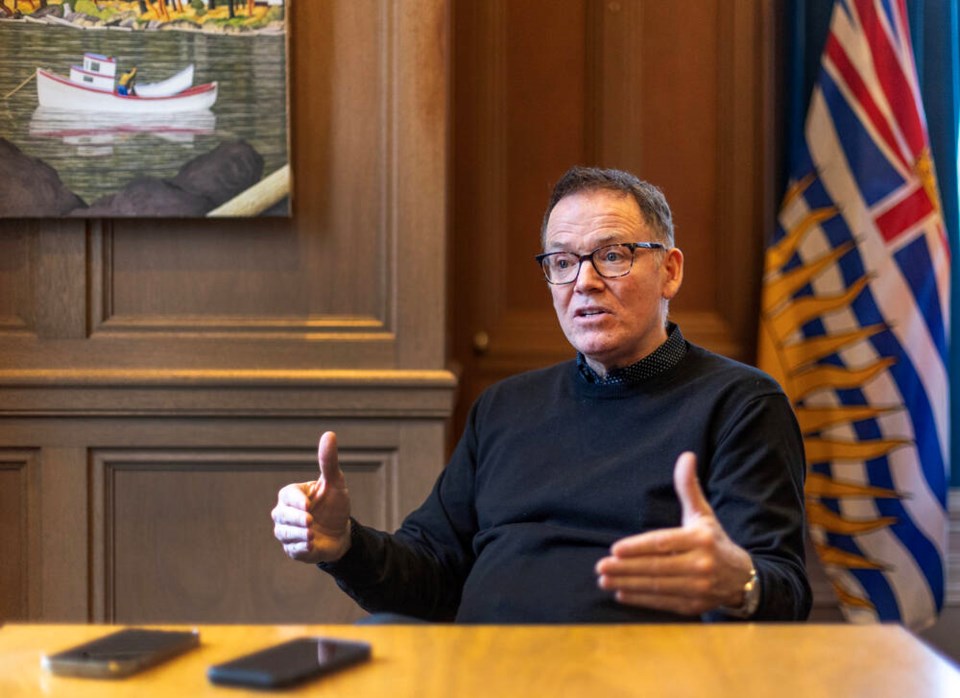BC United leader Kevin Falcon says if he wins the next election, he would eliminate the PST on residential construction, launch a government-subsidized rent-to-own program and eliminate the property transfer tax for first-time homebuyers on homes valued up to $1 million.
“I have been saying since I became leader of the opposition to this government, that if you want more affordable housing, you have to make it less expensive,” Falcon said at a news conference at the legislature Thursday.
The rent-to-own program would require developers of new housing to set aside 15 per cent of the units for first-time homebuyers. The qualified buyers would pay market rent for three years, 100 per cent of which would be applied to their down payment, Falcon said.
The government would pay the landlords during the three-year period to ensure their costs are covered.
“It will mean that a lot of current renters will now have an opportunity to get into the housing market and be able to actually own their own home,” Falcon said.
Falcon cited a successful example of a rent-to-own program in Port Moody where developer Panatch Group offered 10 per cent of the units in a 358-unit development on Electric Avenue as rent to own. He said government financing is needed to expand the program on a larger scale.
On the property transfer tax, Falcon said the move would save first-time homebuyers up to $18,000. For homes sold for more than $1 million, the tax would only apply to the amount beyond the first million.
B.C.’s existing first time homebuyer program exempts people from paying the property transfer tax on homes purchased for $500,000 or less, but many have criticized the program as it’s nearly impossible to buy a property in major urban centres for less than half a million.
Falcon’s platform also includes a pledge to use empty public land to build affordable housing by offering non-profits and market homebuilders 99-year leases for $1 a year. In exchange, the government would require homebuilders to construct below-market rentals.
Asked how the below-market housing plan was different from the NDP’s newly released B.C. Builds plan — which would use $2 billion in government low-cost financing to help non-profits build rental housing where 15 per cent of units would be rented at below-market prices — Falcon said his plan would see the government “get out of the way.”
Falcon, who worked for real estate developer and private equity firm Anthem Capital Corp. before returning to politics in 2022, said the current B.C. NDP government doesn’t “know how to build housing.”
He slammed the B.C. NDP’s HousingHub program, which has built 16,000 affordable homes, far short of the 114,000 homes promised over 10 years when the program was launched in 2018.
Speaking to reporters in Vancouver on Thursday, B.C. Housing Minister Kahlon called Falcon’s housing plan underwhelming.
Kahlon said Falcon was finance minister in 2008 under the former B.C. Liberal government when the Little Mountain housing project was sold to Holborn Property Ltd., a private developer and Liberal campaign donor.
Holborn knocked down the public housing and has not yet fulfilled its promise to rebuild below-market units.
Falcon’s plan to lease public land to developers “sounds a lot like Little Mountain to me,” Kahlon said. “We’re still dealing with those failed policies from before. The last thing we need is to go backwards … when it comes to housing.”
Kahlon said the NDP plan, which focuses on below-market rentals, will eventually have a home-ownership component but he did not have specific details or timelines.
Trevor Koot, CEO of the B.C. Real Estate Association, said he’s glad to see a clear policy direction from BC United on housing.
However, the party has a challenge, he said, because the B.C. NDP have been “extremely aggressive” in responding to the housing crisis with policies aimed at boosting housing supply in single-family neighbourhoods and near transit hubs.
Koot said the association supports a review of the property transfer tax, since the parameters haven’t changed with the market.
Falcon’s policies are aimed at encouraging buying a home, Koot said, but “we need to incentivize supply.”



